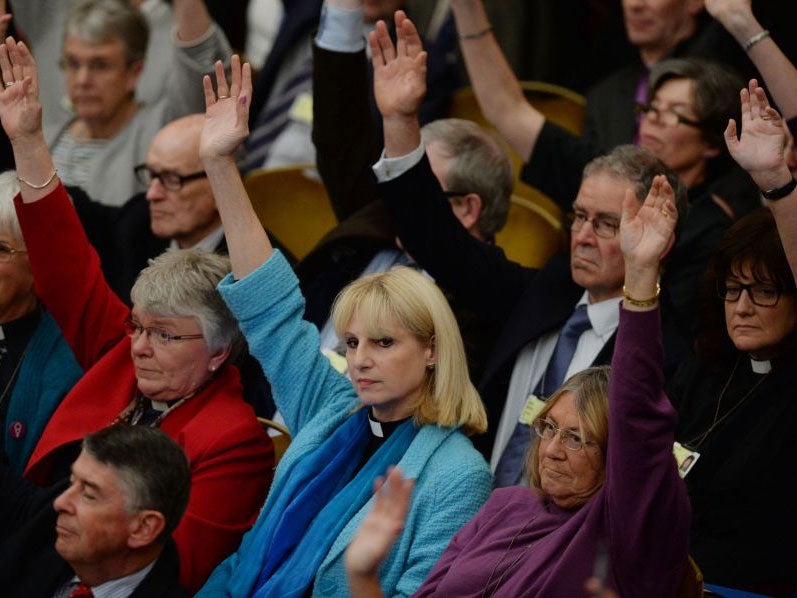Women bishops: Whether you want to be ordained or not, the Church of England's vote is inspiring
Aside from the first female appointments scheduled for next year, the consequences of the vote ripple out more than you might realise

Your support helps us to tell the story
From reproductive rights to climate change to Big Tech, The Independent is on the ground when the story is developing. Whether it's investigating the financials of Elon Musk's pro-Trump PAC or producing our latest documentary, 'The A Word', which shines a light on the American women fighting for reproductive rights, we know how important it is to parse out the facts from the messaging.
At such a critical moment in US history, we need reporters on the ground. Your donation allows us to keep sending journalists to speak to both sides of the story.
The Independent is trusted by Americans across the entire political spectrum. And unlike many other quality news outlets, we choose not to lock Americans out of our reporting and analysis with paywalls. We believe quality journalism should be available to everyone, paid for by those who can afford it.
Your support makes all the difference.Yesterday, somewhere in central London a middle aged man asked for a show of hands. Almost all of the 450 right arms in the room extended and the Church of England brought in legislation finally securing Women Bishops. I called my nine year old niece and proudly announced “Lucy, guess what! You can now be a Bishop!”. “But I don’t want to be a bishop!” she protested. “Yes, but you can!” I explained.
When I was nine-years-old I had no concept of female priests. The Vicar of Dibley and the grandmotherly local priests who do assemblies at schools like Lucy’s were unheard of. Religious leaders were men. I was well into my teens by the time the Church of England battled through to establish that women priests could and should exist.
The Church of England took the decision not to reject those who disagreed. We promised to ordain women but also to protect the positions of those who believe women priests are invalid. This hasn’t been easy. Alongside generous conservatives there are pockets where basic sexism has festered with theology.
Perhaps the greatest number of casualties were the ambitious, intelligent women outside the church who felt excluded from faith because they overheard us say God is distant and male and bullish. “It’s God’s church and he can do what he wants with it” tweeted one angry conservative after the vote. It’s hard to miss a male pronoun from someone arguing against women bishops. I’m all for staying together as one happy family, but having agreed it in principle over 20 years ago, if the church hadn’t got on with ordaining women as bishops, it might as well have stopped baptising girls.
I gazed enviously at other countries who brought in women priests and bishops in one move, irrespective of opposition. Change seems easier if you do it fast and forcefully.
The vote for women bishops in 2012 offered protection to them in the form of a legal clause. It seemed fair. When it failed we were devastated, but afterwards new way emerged: a way forward not based on rights but on forming relationships through dialogue. An expert negotiator was brought in from the Northern Irish peace process and hours and hours of coffees and conference meetings commenced. The result? We have passed women bishops legislation and with very few conservatives leaving the table.
The consequences of this ripple out more than most realise. There are still questions of inclusion for the church to face, but at least I won’t have to answer the crude but frequent question from female undergraduates of “Isn’t the church institutionally sexist?”
The arrival of women bishops announces to women of all beliefs that the God of the Church of England is not distant, male and middle-aged. I was a little older than my niece when faith became real to me. I decided to read the stories of Jesus for myself, to work out what all the fuss was about. I found the liberating, inclusive leadership of Christ enthralling. But it was when I realised that the character of Mary, his mother, would have been young and female like me, that it suddenly became mine.
So what now? Well the Church will appoint its first women bishop in early 2015, the diocese of Southwell and Nottingham have already advertised for their new bishop to be “a woman or a man” with their desired criteria. David Cameron has promised to get a woman bishop into the House of Lords as soon as possible. And I hope little girls throughout the UK will see Bishop Vivienne or Rachel or whoever, and grow up never imagining that, should they wish to explore faith, that they would face any exclusion because of their gender.
Join our commenting forum
Join thought-provoking conversations, follow other Independent readers and see their replies
Comments